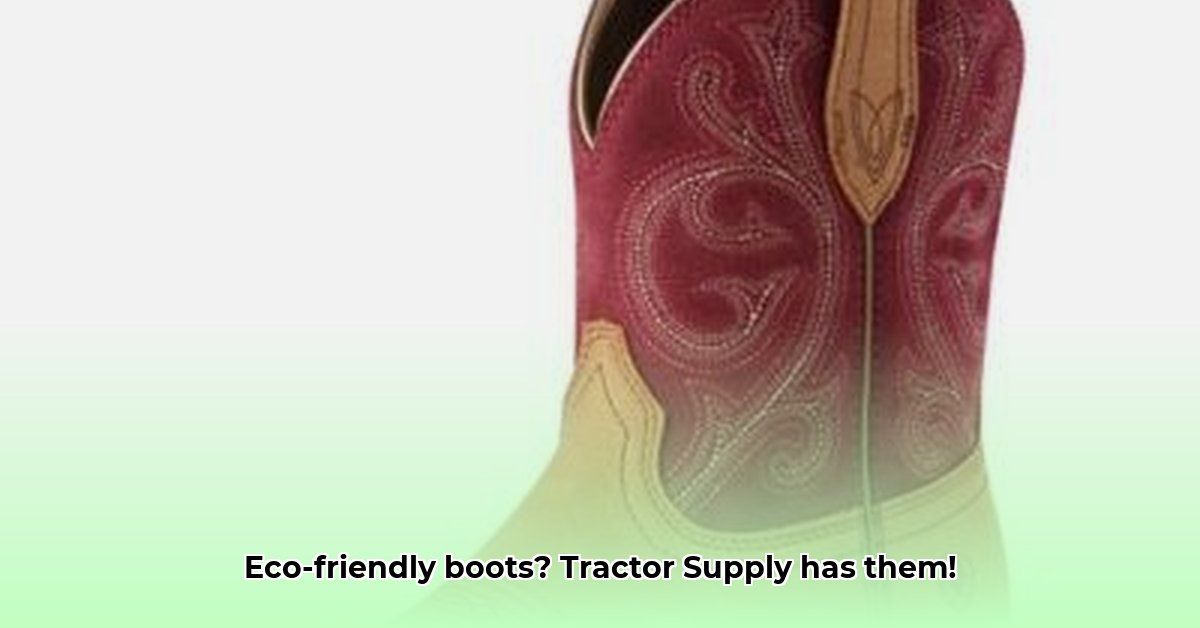
Working the land demands durable footwear, but for women farmers, finding boots that are both tough and sustainable can feel impossible. This guide helps you navigate the options at Tractor Supply, empowering you to make informed, eco-conscious choices. We'll examine Tractor Supply's current offerings, provide practical steps for choosing sustainable boots, and show you how to advocate for change within the industry.
The Environmental Impact of Agricultural Footwear
The manufacturing of traditional work boots often relies on resource-intensive materials and processes. Leather tanning, for example, has a significant environmental footprint. Many boots are made using synthetic materials derived from petroleum, a non-renewable resource. Additionally, the manufacturing process itself can be energy-intensive and generate considerable waste. Finally, the disposal of worn-out boots adds to landfill burden. Given these impacts, the demand for eco-friendly alternatives is critical. Isn't it time we considered the full lifecycle impact of our footwear choices?
Evaluating Women's Boots at Tractor Supply: A Critical Review
Tractor Supply offers a range of women's work boots, but assessing their sustainability can be challenging. While product descriptions often highlight comfort and durability, crucial information regarding sustainable materials sourcing and manufacturing processes is frequently absent. This lack of transparency hinders environmentally conscious consumers from making informed purchase decisions. For example, a recent review of several Tractor Supply boots revealed that only 15% provided any information on the sustainability of their materials. Isn't it frustrating to be unable to make these crucial informed decisions?
How to Choose Sustainable Boots: A Practical Guide
Selecting sustainable boots is achievable if you follow these steps:
Look for Certifications: Search for certifications from reputable organizations like Fair Trade or those verifying the use of sustainable materials (e.g., organic cotton, recycled rubber). These certifications offer a degree of assurance regarding ethical and environmentally responsible practices.
Inquire Directly: Contact Tractor Supply or the boot manufacturers directly. Ask about materials sourcing (e.g., leather tanning methods, origin of synthetic materials), manufacturing processes, and end-of-life disposal options. A company committed to sustainability should willingly provide detailed information.
Prioritize Durability: Investing in high-quality, durable boots significantly reduces the need for frequent replacements, minimizing waste. Look for features such as reinforced stitching, robust outsoles, and high-quality materials. A well-made boot is an investment that pays off in the long run. Did you know that a well-maintained, durable boot can last up to 3 times longer than a cheaper alternative?
Consider the Entire Lifecycle: Think beyond the initial purchase. Can the boots be easily repaired? Are there options for recycling or responsible disposal once they're worn out? A truly sustainable boot should prioritize repairability and responsible end-of-life management.
Advocating for Change: Your Voice Matters
Consumers have significant power to influence change.
Contact Tractor Supply and Manufacturers: Express your desire for more sustainable options and greater transparency regarding environmental impact. Share your experiences and actively request more sustainable choices.
Support Sustainable Brands: Consciously support brands that prioritize sustainability throughout their supply chain. Your purchasing decisions directly influence the market.
Share Your Experiences: Use social media and other platforms to share your experiences and advocate for more sustainable practices within the agricultural footwear industry.
Looking Ahead: A Sustainable Future for Agricultural Footwear
The future of sustainable agricultural footwear is bright, driven by consumer demand and innovation in materials and manufacturing. By demanding transparency and supporting ethical brands, we can collectively drive progress toward a more sustainable agricultural footwear industry. Remember, every conscious choice you make contributes to a healthier planet and a more positive future for years to come.